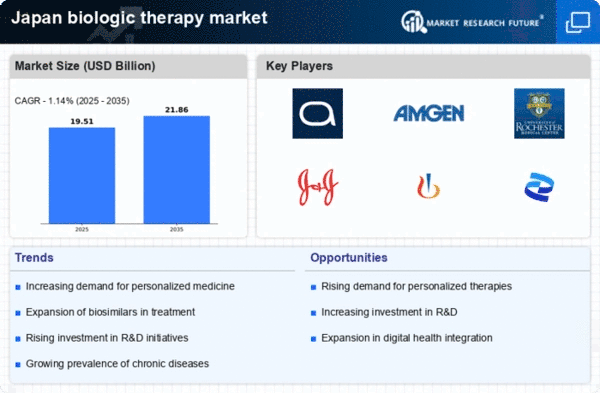Growing Aging Population
Japan's demographic shift towards an aging population is a significant driver for the biologic therapy market. With over 28% of the population aged 65 and older, the demand for effective treatment options for age-related diseases is escalating. Elderly patients often experience multiple chronic conditions, necessitating the use of biologic therapies that can address complex health issues. The biologic therapy market is projected to grow as healthcare systems adapt to the needs of this demographic. In 2025, it is estimated that spending on biologics for elderly patients will account for nearly 40% of total biologic expenditures. This trend highlights the importance of biologic therapies in managing the health of Japan's aging population, ensuring that they receive appropriate and effective care.
Increased Healthcare Expenditure
The rise in healthcare expenditure in Japan is a crucial factor influencing the biologic therapy market. With the government prioritizing healthcare funding, total healthcare spending is expected to reach ¥50 trillion by 2026. This increase allows for greater investment in advanced therapies, including biologics. As healthcare budgets expand, hospitals and clinics are more likely to adopt innovative treatment options that improve patient outcomes. The biologic therapy market stands to benefit from this trend, as healthcare providers seek to incorporate cutting-edge therapies into their treatment protocols. Additionally, the shift towards value-based care emphasizes the need for effective treatments, further driving the adoption of biologic therapies. This financial commitment to healthcare innovation is likely to enhance the accessibility and availability of biologic therapies across Japan.
Advancements in Biologic Research
Innovations in biologic research are transforming the landscape of the biologic therapy market in Japan. The development of monoclonal antibodies, gene therapies, and personalized medicine is at the forefront of this evolution. Research institutions and pharmaceutical companies are investing heavily in R&D, with expenditures exceeding ¥500 billion annually. These advancements are leading to the introduction of novel biologic agents that target specific pathways involved in disease progression. Furthermore, collaborations between academia and industry are fostering a conducive environment for innovation. As a result, the biologic therapy market is likely to witness a surge in new product launches, enhancing treatment options for patients. The continuous evolution of biologic therapies not only improves efficacy but also reduces adverse effects, thereby increasing patient adherence and satisfaction.
Regulatory Framework Enhancements
The evolving regulatory framework in Japan is fostering a favorable environment for the biologic therapy market. Recent reforms aimed at expediting the approval process for new biologic drugs are encouraging pharmaceutical companies to invest in this sector. The Pharmaceuticals and Medical Devices Agency (PMDA) has implemented measures to streamline clinical trials and reduce time to market for innovative therapies. As a result, the biologic therapy market is likely to experience an influx of new products, enhancing treatment options for patients. Furthermore, the regulatory support for biosimilars is expected to increase competition, potentially lowering costs and improving access to biologic therapies. This proactive regulatory approach not only stimulates innovation but also ensures that patients benefit from the latest advancements in biologic treatments.
Increasing Prevalence of Chronic Diseases
The rising incidence of chronic diseases in Japan is a pivotal driver for the biologic therapy market. Conditions such as rheumatoid arthritis, psoriasis, and various cancers are becoming more prevalent, necessitating advanced treatment options. According to recent health statistics, approximately 30% of the Japanese population suffers from chronic ailments, which propels the demand for biologic therapies. These therapies offer targeted treatment modalities that are often more effective than traditional medications. As healthcare providers seek to improve patient outcomes, the biologic therapy market is expected to expand significantly. The increasing burden of chronic diseases not only influences treatment protocols but also drives healthcare expenditure, with spending on biologics projected to reach ¥1 trillion by 2026. This trend underscores the critical role of biologic therapies in addressing the healthcare challenges posed by chronic conditions.
















